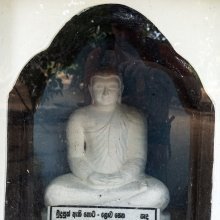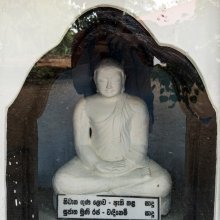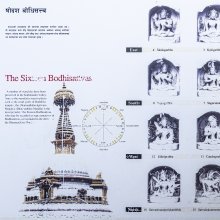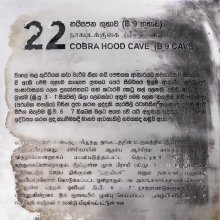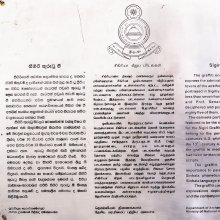Ati, Āti, Atī, Āṭi: 24 definitions
Introduction:
Ati means something in Hinduism, Sanskrit, Buddhism, Pali, the history of ancient India, Marathi, Hindi, biology, Tamil. If you want to know the exact meaning, history, etymology or English translation of this term then check out the descriptions on this page. Add your comment or reference to a book if you want to contribute to this summary article.
Images (photo gallery)
(+37 more images available)
In Hinduism
Vyakarana (Sanskrit grammar)
Source: Wikisource: A dictionary of Sanskrit grammarĀti (आति).—tad. affix आत् (āt) applied to उत्तर, अधर (uttara, adhara) and दक्षिण (dakṣiṇa) by P.V.3.34.

Vyakarana (व्याकरण, vyākaraṇa) refers to Sanskrit grammar and represents one of the six additional sciences (vedanga) to be studied along with the Vedas. Vyakarana concerns itself with the rules of Sanskrit grammar and linguistic analysis in order to establish the correct context of words and sentences.
Ayurveda (science of life)
Veterinary Medicine (The study and treatment of Animals)
Source: Shodhganga: Portrayal of Animal Kingdom (Tiryaks) in Epics An Analytical studyĀṭi (आटि) refers to the Cotton teal (Nettapus Coromandelianus), according to scientific texts such as the Mṛgapakṣiśāstra (Mriga-pakshi-shastra) or “the ancient Indian science of animals and birds” by Hamsadeva, containing the varieties and descriptions of the animals and birds seen in the Sanskrit Epics such as the Ramayana and Mahabharata.
Unclassified Ayurveda definitions
Source: gurumukhi.ru: Ayurveda glossary of termsAti (अति):—Excessive or Hyperactive

Āyurveda (आयुर्वेद, ayurveda) is a branch of Indian science dealing with medicine, herbalism, taxology, anatomy, surgery, alchemy and related topics. Traditional practice of Āyurveda in ancient India dates back to at least the first millenium BC. Literature is commonly written in Sanskrit using various poetic metres.
India history and geography
Source: Shodhganga: Temples and cult of Sri Rama in Tamilnadu (history)Ati refers to the month in the Tamil tradition corresponding to the months July-August.—[The festivals of Ati are: Atippuram – Antal-kalyanam].—Festivals take place in all Tamil moths of the year, beginning with Cittirai (April-May) and ending with Pankuni (March-April).—The rules and regulations for daily offerings and the periodical festivals [viz., Ati] are laid down in the Agamas.

The history of India traces the identification of countries, villages, towns and other regions of India, as well as mythology, zoology, royal dynasties, rulers, tribes, local festivities and traditions and regional languages. Ancient India enjoyed religious freedom and encourages the path of Dharma, a concept common to Buddhism, Hinduism, and Jainism.
Biology (plants and animals)
Source: Wisdom Library: Local Names of Plants and DrugsAti [अटी] in the Marathi language is the name of a plant identified with Helicteres isora L. from the Sterculiaceae (Cacao) family. For the possible medicinal usage of ati, you can check this page for potential sources and references, although be aware that any some or none of the side-effects may not be mentioned here, wether they be harmful or beneficial to health.
Source: Google Books: CRC World Dictionary (Regional names)1) Athi in India is the name of a plant defined with Bauhinia racemosa in various botanical sources. This page contains potential references in Ayurveda, modern medicine, and other folk traditions or local practices It has the synonym Piliostigma racemosum (Lam.) Benth. (among others).
2) Athi is also identified with Ficus racemosa It has the synonym Covellia glomerata (Roxburgh) Miquel (etc.).
3) Athi is also identified with Senna auriculata It has the synonym Cassia densistipulata Taub. (etc.).
4) Athi is also identified with Sesbania grandiflora It has the synonym Aeschynomene coccinea L.f. (etc.).
Example references for further research on medicinal uses or toxicity (see latin names for full list):
· Braz. J. Med. Biol. Res.
· Symbolae Botanicae (1794)
· Indian J. Chem.
· Biotropica (2006)
· Species Plantarum (1753)
· Journal of Agricultural and Food Chemistry (2541)
If you are looking for specific details regarding Athi, for example health benefits, extract dosage, chemical composition, diet and recipes, pregnancy safety, side effects, have a look at these references.

This sections includes definitions from the five kingdoms of living things: Animals, Plants, Fungi, Protists and Monera. It will include both the official binomial nomenclature (scientific names usually in Latin) as well as regional spellings and variants.
Languages of India and abroad
Pali-English dictionary
Source: BuddhaSasana: Concise Pali-English Dictionaryati : (prefix) a prefix giving the meanings: up to, over, gone beyond, excess, etc.
Source: Sutta: The Pali Text Society's Pali-English DictionaryAti, (indecl.) (sk. ati = Gr. e)/ti moreover, yet, and; Lat. et and, Goth. ip; also connected with Gr. ataρ but, Lat. at but (= over, outside) Goth. appan) adv. and prep. of direction (forward motion), in primary meaning “on, and further”, then “up to and beyond”. I. in abstr. position adverbially (only as ttg.): in excess, extremely, very (cp. II, 3) J. VI, 133 (ati uggata C. = accuggata T.), 307 (ati ahitaṃ C. = accāhitaṃ T.).
II. as prefix, meaning.—1. on to, up to, towards, until); as far as: accanta up to the end; aticchati to go further, pass on; atipāta “falling on to”; attack slaying; atimāpeti to put damage on to, i.e. to destroy.—2. over, beyond, past, by, trans-; with verbs: (a.) trs. atikkamati to pass beyond, surpass; atimaññati to put one’s “manas” over, to despise; atirocati to surpass in splendour. (b.) intr. atikkanta passed by; atikkama traversing; aticca transgressing; atīta past, gone beyond.—Also with verbal derivations: accaya lapse, also sin, transgression (“going over”); atireka remainder, left over; atisaya overflow, abundance; atisāra stepping over, sin.—3. exceedingly, in a high or excessive degree either very (much) or too (much); in nominal compn. (a), rarely also in verbal compn. see (b).—(a) with nouns & adj. : °āsanna too near; °uttama the very highest; °udaka too much water; °khippa too soon; °dāna excessive alms giving; °dāruṇa very cruel; °dīgha extremely long; °dūra too near; deva a super-god °pago too early; °bālha too much; °bhāra a too heavy load; °manāpa very lovely; °manohara very charming; °mahant too great; °vikāla very inconvenient; °vela a very long time; °sambādha too tight, etc. etc. ‹-› (b.) with verb: atibhuñjati to eat excessively.
III, A peculiar use of ati is its’function in reduplication-compounds, expressing “and, adding further, and so on, even more, etc.” like that of the other comparing or contrasting prefixes a (ā), anu, ava, paṭi, vi (e.g. khaṇḍâkhaṇḍa, seṭṭhânuseṭṭhi, chiddâvacchidda, aṅgapaccaṅga, cuṇṇavicuṇṇa). In this function it is however restricted to comparatively few expressions and has not by far the wide range of ā (q. v.), the only phrases being the foll. viz. cakkâticakkaṃ mañcâtimañcaṃ bandhati to heap carts upon carts, couches upon couches (in order to see a procession) Vin. IV, 360 (Bdhgh); J. II, 331; IV, 81; DhA. IV, 61. —devâtideva god upon god, god and more than a god (see atideva); mānâtimāna all kinds of conceit; vaṅkâtivaṅka crooked all over J. I, 160.—IV. Semantically ati is closely related to abhi, so that in consequence of dialectical variation we frequently find ati in Pāli, where the corresp. expression in later Sk. shows abhi. See e.g. the foll. cases for comparison: accuṇha ati-jāta, °pīḷita °brūheti, °vassati, °vāyati, °veṭheti.
Note The contracted (assimilation-) form of ati before vowels is acc- (q. v.). See also for adv. use atiriva, ativiya, atīva. (Page 17)

Pali is the language of the Tipiṭaka, which is the sacred canon of Theravāda Buddhism and contains much of the Buddha’s speech. Closeley related to Sanskrit, both languages are used interchangeably between religions.
Marathi-English dictionary
Source: DDSA: The Molesworth Marathi and English Dictionaryaṭī (अटी).—f The colored and twisted cord worn around the arm during the Muharram. 2 In plays with marbles. The thumb depressed &c. See aṭa.
--- OR ---
ati (अति).—ad (S) Much, very, excessively, extremely. Pr. ati sarvatra varjayēt Extremes are always bad. 2 insep prep Over, beyond, surpassing, exceeding, transcending. Prefixed to Sanskrit words ad libitum: such therefore as atikaṭhina, atimṛdu, atimiṣṭa, atikrōdhī, atigarva &c., of which the import is manifest, are not in this dictionary, whilst others of less obvious signification occur in order.
Source: DDSA: The Aryabhusan school dictionary, Marathi-Englishati (अति).—ad Excessively, too much. Beyond. ati sarvatra varjayēt Extremes are always bad.
Marathi is an Indo-European language having over 70 million native speakers people in (predominantly) Maharashtra India. Marathi, like many other Indo-Aryan languages, evolved from early forms of Prakrit, which itself is a subset of Sanskrit, one of the most ancient languages of the world.
Sanskrit dictionary
Source: DDSA: The practical Sanskrit-English dictionaryAti (अति).—ind. [at-i]
1) A prefix used with adjectives and adverbs, meaning 'very', 'too', 'exceedingly', 'excessively', 'very much', and showing उत्कर्ष (utkarṣa); Surpassing, superior अत्याश्रमानयं सर्वानू (atyāśramānayaṃ sarvānū) Mahābhārata (Bombay) 12.12.6. नातिदूरे (nātidūre) not very far from; °कृश (kṛśa) very lean; °भृशम् (bhṛśam) very much; also with verbs or verbal forms; °सिक्तमेव भवता (siktameva bhavatā) Sk.; स्वभावो ह्यतिरिच्यते (svabhāvo hyatiricyate) &c.
2) (With verbs) Over, beyond; अति-इ (ati-i) go beyond, overstep; so °क्रम् °चर् °वह् (kram °car °vah) &c. In this case अति (ati) is regarded as a preposition उपसर्ग (upasarga).
3) (a) (With nouns or pronouns) Beyond, past, surpassing, superior to, eminent, respectable, distinguished, higher, above, (used with acc. as a karmapravacanīya, or as first member of Bah. or Tat. Comp. jyāśabdastāvubhau śabdāvati rāmasya śuśruve Rām. 6.75.37. in which last case it has usually the sense of eminence or higher degree: atigo, °gārgyaḥ, = praśastā gauḥ, śobhano gārgyaḥ; °rājan an excellent king; or the sense of atikrānta must be understood with the latter member which will then stand in the accusative case; atimartyaḥ = martyamatikrāntaḥ; °mālaḥ, atikrānto mālām; so atikāya, °keśara, q. v.):, अत्यादित्यं हुतवहमुखे संभृतं तद्धि तेजः (atyādityaṃ hutavahamukhe saṃbhṛtaṃ taddhi tejaḥ) Me 1.45. Surpassing the sun. अति देवानू कृष्णः (ati devānū kṛṣṇaḥ) Sk.; मानुषानतिगन्धर्वान् सर्वान्गन्धर्व लक्षये (mānuṣānatigandharvān sarvāngandharva lakṣaye) Mb; °मानुषं कर्म (mānuṣaṃ karma) a deed which is beyond human power, i. e. a superhuman action; °कशः (kaśaḥ) past the whip (as a horse), unmanageable; °त्यद् (tyad) surpassing that; °त्वाम्, °त्वान् (tvām, °tvān) him or them that surpasses or surpass thee, so °मां, °यूयं (māṃ, °yūyaṃ) &c. (b) (With nouns derived from roots) Extravagant, exaggerated, inordinate, excessive, extraordinary; e. g. °आदरः (ādaraḥ) excessive regard; °आशा (āśā) extravagant hope; so °भयं, °तृष्णा, °आनन्दः (bhayaṃ, °tṛṣṇā, °ānandaḥ) &c. &c.; अतिदानाद् बलिर्बद्धो नष्टो मानात्सुयोधनः । विनष्टो रावणो लौल्यादति सर्वत्र वर्जयेत् (atidānād balirbaddho naṣṭo mānātsuyodhanaḥ | vinaṣṭo rāvaṇo laulyādati sarvatra varjayet) || cf. 'extremes are ever bad.' (c) Unfit, idle, improper, in the sense of असंप्रति (asaṃprati) or क्षेप (kṣepa) 'censure'; अतिनिद्रम् (atinidram) = निद्रा सम्प्रति न युज्यते (nidrā samprati na yujyate) Sk. The गणरत्नमहोदधि (gaṇaratnamahodadhi) gives the following senses of अतिः--विक्रमातिक्रमाबुद्धिभृशार्थातिशयेष्वति (atiḥ--vikramātikramābuddhibhṛśārthātiśayeṣvati) | e. g. अतिरथः रथाधिकं विक्रमवान् (atirathaḥ rathādhikaṃ vikramavān); °मतिः बुद्ध्यतिक्रमः (matiḥ buddhyatikramaḥ); °गहनं वुद्धेरविषयः (gahanaṃ vuddheraviṣayaḥ); °तप्तं भृशतप्तं (taptaṃ bhṛśataptaṃ); °वेगः अतिशयितो वेगः (vegaḥ atiśayito vegaḥ). Cf. also प्रकर्षे लङ्घनेऽप्यति (prakarṣe laṅghane'pyati) Nm.
--- OR ---
Atī (अती).—[ati-i] 2 P.
1) To go beyond, pass on, over or beyond, cross (time or space); स्तोकमन्तरमतीत्य (stokamantaramatītya) Ś. 1; जवादतीये हिमवानधोमुखैः (javādatīye himavānadhomukhaiḥ) Kirātārjunīya 14.54 was gone to or reached; स्थातव्यं ते नयनविषयं यावदत्येति भानुः (sthātavyaṃ te nayanaviṣayaṃ yāvadatyeti bhānuḥ) Meghadūta 36 passes out of sight; अतीत्यैकादशाहं तु नामकर्म तथाऽकरोत् (atītyaikādaśāhaṃ tu nāmakarma tathā'karot) Rām. after 11 days; गृहपङ्क्तयश्चिरमतायिरे जनैः (gṛhapaṅktayaściramatāyire janaiḥ) Śiśupālavadha 13.53.
2) To enter, step over; अद्वारेण च नातीयात् ग्रामं वा वेश्म वा वृतम् (advāreṇa ca nātīyāt grāmaṃ vā veśma vā vṛtam) Manusmṛti 4.73.
3) To excel, surpass, outstrip, be more than a match for; त्रिस्रोतसः कान्तिमतीत्य तस्थौ (trisrotasaḥ kāntimatītya tasthau) Kumārasambhava 7.15; सत्यमतीत्य हरितो हरिंश्च वर्तन्ते वाजिनः (satyamatītya harito hariṃśca vartante vājinaḥ) Ś.1; अग्निस्त्विषा नात्येति पूषणम् (agnistviṣā nātyeti pūṣaṇam) Śiśupālavadha 2.23; to exceed, go beyond, transcend; कुसीदवृद्धिर्द्वैगुण्यं नात्येति (kusīdavṛddhirdvaiguṇyaṃ nātyeti) Manusmṛti 8.151 does not exceed; अतीत्य वाचां मनसां च गोचरं स्थिताय (atītya vācāṃ manasāṃ ca gocaraṃ sthitāya) Kirātārjunīya 18.41, अपराधशतक्षमं नृपः क्षमयात्येति भवन्तमेकया (aparādhaśatakṣamaṃ nṛpaḥ kṣamayātyeti bhavantamekayā) Śi 16.48.
4) To overcome, subdue, vanquish, get the better of; न प्रदीप इव वायुमत्यगात् (na pradīpa iva vāyumatyagāt) R. 19.53 did not overcome, outlive or survive; to overtake, out-do
5) To walk by, walk past, pass by, leave behind; स्रोतोवहां पथि निकामजलामतीत्य (srotovahāṃ pathi nikāmajalāmatītya) Ś.6.16; सोऽत्य- गाद् आश्रमम् (so'tya- gād āśramam) R.15.37.
6) To omit, neglect, disregard, violate, transgress, overstep; न दिष्टमर्थमत्येतुमीशो मर्त्यः कथंचन (na diṣṭamarthamatyetumīśo martyaḥ kathaṃcana) Mb. avoid; अतीत्य ही गुणान् सर्वान् स्वभावो मूर्ध्नि वर्तते (atītya hī guṇān sarvān svabhāvo mūrdhni vartate) H.1.18 देशं कालं च योऽतीयात् (deśaṃ kālaṃ ca yo'tīyāt) Y.2.195; अतीयात्सागरो वेलां न प्रतिज्ञामहं पितुः (atīyātsāgaro velāṃ na pratijñāmahaṃ pituḥ) Rām.; भूतान्यत्येति पञ्च वै (bhūtānyatyeti pañca vai) Manusmṛti 12.9 oversteps the five elements (mokṣaṃ prāpnoti Kull.); अत्येति तत्सर्वमिदं विदित्वा (atyeti tatsarvamidaṃ viditvā) Bhagavadgītā (Bombay) 8.28,14.2.
7) (Intrans.) To pass, elapse (time); अत्येति रजनी या तु सा न प्रतिनिवर्तते (atyeti rajanī yā tu sā na pratinivartate) Rām.; अतीते दक्षिणायने (atīte dakṣiṇāyane) &c.
8) To overflow, be redundant, be in excess.
9) To die.
--- OR ---
Āṭi (आटि).—[ā-aṭ-iṇ]
1) A kind of bird (śarāri) (also written āṭi) cf. आटिराडी शराडी च शरारी राडिराडिका (āṭirāḍī śarāḍī ca śarārī rāḍirāḍikā)
2) A sort of fish.
Derivable forms: āṭiḥ (आटिः).
--- OR ---
Āti (आति).—A kind of acquatic bird. ता आतयो न तन्वः शुम्भत स्वा (tā ātayo na tanvaḥ śumbhata svā) Ṛgveda 1.95.9.
Derivable forms: ātiḥ (आतिः).
--- OR ---
Āti (आति).—= आटि (āṭi) q. v. (cf. P.III.3.18 Vār. and Uṇādi-sūtra 4.13).
Derivable forms: ātiḥ (आतिः).
Source: Cologne Digital Sanskrit Dictionaries: Edgerton Buddhist Hybrid Sanskrit DictionaryAti (अति).—[, read Atri, name of a Prajāpati: Mahā-Māyūrī 257.18.]
--- OR ---
Ati (अति).—[ tvāṃ: Lalitavistara 253.8 (verse), so text, but most mss. atīva, and so Tibetan (śin tu); read atīvā (m.c.).]
Source: Cologne Digital Sanskrit Dictionaries: Shabda-Sagara Sanskrit-English DictionaryAti (अति).—ind. Over, beyond, exceeding, much, very much, &c. it implies generally excess, or preeminence. E. ata to go, and in aff.
--- OR ---
Āṭi (आटि).—m.
(-ṭiḥ) The S'arali, a bird so called, (Turdus ginginianus.) E. āṅ before aṭa to go, in aff.
--- OR ---
Āti (आति).—m.
(-tiḥ) 1. A bird. 2. Going. E. at to go, iṇ affix: or Unadi affix in.
Source: Cologne Digital Sanskrit Dictionaries: Benfey Sanskrit-English DictionaryAti (अति).—. I. adv. Over, exceedingly in a high degree, much. Comparat. ati + tarām, very much, [Vedāntasāra, (in my Chrestomathy.)] in
— Cf. [Latin] at atavus, and et.
Source: Cologne Digital Sanskrit Dictionaries: Cappeller Sanskrit-English DictionaryAti (अति).—[adverb] (mostly °—) across, beyond, past, over, excessively, quite, most; as [preposition] beyond, over ([with] [accusative], [rarely] [genetive]).
--- OR ---
Āti (आति).—[feminine] a kind of water-bird.
--- OR ---
Ātī (आती).—[feminine] a kind of water-bird.
--- OR ---
Atī (अती).—go beyond or past; go in, enter; overstep, exceed, overwhelm; leave behind, neglect, escape.
Atī is a Sanskrit compound consisting of the terms ati and i (इ).
Source: Cologne Digital Sanskrit Dictionaries: Monier-Williams Sanskrit-English Dictionary1) Ati (अति):—ind. ([probably neut. of an obsolete [adjective (cf. [masculine, feminine and neuter; or adjective])] atin, passing, going, beyond; See √at, and cf. Old [German] anti, unti, inti, unde, indi, etc.; [English] and; [German] und; [Greek] ἔτι, ἀντί, [Latin] ante; [Lithuanian] ant; [Armorican or the language of Brittany] ti; [Zend] aiti]).
2) As a prefix to verbs and their derivatives, expresses beyond, over, and, if not standing by itself, leaves the accent on the verb or its derivative; as, ati-kram (√kram), to overstep, [Vedic or Veda] [Infinitive mood] ati-krame, (fit) to be walked on, to be passed, [Ṛg-veda i, 105, 16], ati-kramaṇa n. See sub voce When prefixed to nouns, not derived from verbs, it expresses beyond, surpassing, as, ati-kaśa, past the whip, ati-mānuṣa, superhuman, etc. See sub voce
3) As a separable adverb or preposition (with [accusative]), [Vedic or Veda] beyond (with [genitive case]) over, at the top of [Ṛg-veda; Atharva-veda]
4) is often prefixed to nouns and adjectives, and rarely to verbs, in the sense excessive, extraordinary, intense;
5) excessively, too
6) exceedingly, very
7) in such compounds the accent is generally on ati.
8) Atī (अती):—(√i) [class] 2. [Parasmaipada] aty-eti, -etum, to pass by, elapse, pass over, overflow;
—to pass on;
—to get over;
— ([Vedic or Veda] [Infinitive mood] aty-etavai), to pass through, [Ṛg-veda v, 83, 10];
—to defer;
—to enter;
—to overcome, overtake, outdo;
—to pass by, neglect;
—to overstep, violate;
—to be redundant;
—to die:—[Intensive] atīyate, to overcome.
9) Āṭi (आटि):—f. Name of the bird Turdus Ginginianus, [Pāraskara-gṛhya-sūtra] (cf. āḍi and āti.)
10) Āti (आति):—f. (√at, [Pāṇini 3-3, 108] [commentator or commentary]) an aquatic bird, [Ṛg-veda x, 95, 9; Vājasaneyi-saṃhitā xxiv, 34] ([varia lectio] ātī, [Taittirīya-saṃhitā v]), [Śatapatha-brāhmaṇa xi;]
11) cf. Adi and [Latin] anas, anati-s
12) (= āṭi q.v.) the bird Turdus Ginginianus, [cf. Lexicographers, esp. such as amarasiṃha, halāyudha, hemacandra, etc.]
13) Ātī (आती):—See āti.
Source: Cologne Digital Sanskrit Dictionaries: Goldstücker Sanskrit-English DictionaryAti (अति):—ind. (see nipāta, upasarga, gati, karmapravacanīya)
1) Over, beyond.
2) Exceedingly, very much. This word is used either as a separable preposition with a word following in the accusative, or as an inseparable prefix in composition with verbal and nominal themes. If ati, in composition with a nominal theme, constitutes a [tatpurusha compound] compound, it must either express a higher degree (f. i. in atirājan, a superior or excellent king) or the sense of the word krānta must be supplied after it and the latter part of the compound understood in the sense of the accusative (f. i. in atikhaṭvaḥ which is explained as meaning atikrāntaḥ khaṭvām). E. at, kṛt aff. in(?).
Source: Cologne Digital Sanskrit Dictionaries: Yates Sanskrit-English Dictionary1) Ati (अति):—adv. conj. Over, very much.
2) Āṭi (आटि):—(ṭiḥ) 1. m. The Sarāli, (Turdus ginginianus.)
3) Āti (आति):—(tiḥ) 2. m. A bird.
Source: DDSA: Paia-sadda-mahannavo; a comprehensive Prakrit Hindi dictionary (S)Ati (अति) in the Sanskrit language is related to the Prakrit words: Ai, Aii, Acce, Āḍi.
[Sanskrit to German]
Sanskrit, also spelled संस्कृतम् (saṃskṛtam), is an ancient language of India commonly seen as the grandmother of the Indo-European language family (even English!). Closely allied with Prakrit and Pali, Sanskrit is more exhaustive in both grammar and terms and has the most extensive collection of literature in the world, greatly surpassing its sister-languages Greek and Latin.
Hindi dictionary
Source: DDSA: A practical Hindi-English dictionaryAti (अति):——a prefix expressive of extremity, beyond. over, surpassing, extra, intense, excessive etc.; (nf) excess; ~[kathana] aggrandizement; —[karanā] to commit an excess; to cross the limit, to go too far.
...
Kannada-English dictionary
Source: Alar: Kannada-English corpusAṭi (ಅಟಿ):—[verb] to hit heavily; to strike violently.
--- OR ---
Ati (ಅತಿ):—
1) [adjective] too much; exceedingly much or less.
2) [adjective] above; beyond; super; excelling; transcending;3) [adjective] ಅತಿಯಾಸೆ ಗತಿಗೇಡು [atiyase gatigedu] atiyāse gatigēḍu (prov.) unrestrained greed causes excessive grief; grasp all and lose all; ಅತಿವಿನಯ ಧೂರ್ತನ ಲಕ್ಷಣ [ativinaya dhurtana lakshana] ativinaya dhūrtana lakṣaṇa (prov.) a cheat always pretends to be too humble.
--- OR ---
Ati (ಅತಿ):—[noun] excessiveness; abundance; plenty.
--- OR ---
Ati (ಅತಿ):—
1) [adverb] exceedingly; in plenty.
2) [adverb] ಅತಿಯಾದರೆ ಅಮೃತವೂ ವಿಷ [atiyadare amritavu visha] atiyādare amřtavū viṣa (prov.) too much (of any thing) is too bad; fish and guests smell at three days old.
--- OR ---
Āṭi (ಆಟಿ):—
1) [noun] āṣāḍha, the fourth month of Tuḷu calendar (solar system) corresponding to the period of July-August.
2) [noun] ಆಟಿಗೊಮ್ಮೆ ಸೋಣಕ್ಕೊಮ್ಮೆ [atigomme sonakkomme] āṭigomme sōṇakkomme (id.) sometimes; on occasions; occasionally.
--- OR ---
Āṭi (ಆಟಿ):—[noun] a kind of bird, Turdus ginginianus.
--- OR ---
Āti (ಆತಿ):—[noun] the bird Turdus ginginianus.
Kannada is a Dravidian language (as opposed to the Indo-European language family) mainly spoken in the southwestern region of India.
See also (Relevant definitions)
Starts with (+2077): A-tintukurri, Ati ati, Ati sambar, Ati vitayam, Ati-alapetaitotai, Ati-ambila, Ati-anta-patica, Ati-antakalam, Ati-arahant, Ati-ati paya, Ati-brahmanya, Ati-cukkumatekam, Ati-eti, Ati-issara, Ati-iyaiputotai, Ati-kshipta, Ati-maduram, Ati-maniitu, Ati-marimarru, Ati-markikacattiram.
Ends with (+9980): A-campirannatacamati, Aarbhati, Abandhati, Abbahati, Abbhacikkhati, Abbhakkhati, Abbhanjati, Abbhanumodati, Abbhokirati, Abbhudaharati, Abbhuddhunati, Abbhuggacchati, Abbhuggirati, Abbhukkirati, Abbhunnamati, Abbhussakati, Abbhutthati, Abbhuyyati, Abbuhati, Abbulihati.
Full-text (+2285): Ai, Ativisa, Atireka, Atisara, Ativada, Atyaya, Atirikta, Aticara, Atibhi, Atijava, Akuculapu, Atijagara, Atiroga, Ativyatha, Atisauhitya, Atipathin, Atipravriddha, Aticcarakku, Acce, Atidura.
Relevant text
Search found 105 books and stories containing Ati, Āti, Atī, Āṭi, Aṭī, Ātī, Ati-i, Aṭi, Athi, Aati; (plurals include: Atis, Ātis, Atīs, Āṭis, Aṭīs, Ātīs, is, Aṭis, Athis, Aatis). You can also click to the full overview containing English textual excerpts. Below are direct links for the most relevant articles:
Indian Medicinal Plants (by Kanhoba Ranchoddas Kirtikar)
16. Aconitum heterophyllum. Wall. < [Ranunculaceae (buttercup family)]
Notes on the alkaloid atisine < [Notes]
Notes on rasanjana (aqueous extract of Berberis aristata) < [Notes]
Rig Veda (translation and commentary) (by H. H. Wilson)
Tiruvaymoli (Thiruvaimozhi): English translation (by S. Satyamurthi Ayyangar)
Pasuram 3.7.11 < [Section 7 - Seventh Tiruvaymoli (Payilum Cutar oti)]
Pasuram 3.4.4 < [Section 4 - Fourth Tiruvaymoli (Pukalum nal oruvan)]
Pasuram 2.4.1 < [Section 4 - Fourth Tiruvaymoli (Ati ati)]
Vakyapadiya of Bhartrihari (by K. A. Subramania Iyer)
Verse 3.8.56 < [Book 3 - Pada-kāṇḍa (8): Kriyā-samuddeśa (On Action)]
Verse 2.202 < [Book 2 - Vākya-kāṇḍa]
Verse 1.24-26 < [Book 1 - Brahma-kāṇḍa (or Āgama-samuccaya)]
The history of Andhra country (1000 AD - 1500 AD) (by Yashoda Devi)
Introduction (Parichchedi Dynasty) < [Chapter VI - The Parichchedis (A.D. 1040-1290)]
Chaitanya Bhagavata (by Bhumipati Dāsa)
Verse 3.4.409 < [Chapter 4 - Descriptions of Śrī Acyutānanda’s Pastimes and the Worship of Śrī Mādhavendra]
Verse 1.14.62 < [Chapter 14 - The Lord’s Travel to East Bengal and the Disappearance of Lakṣmīpriyā]
Verse 2.3.187 < [Chapter 3 - The Lord Manifests His Varāha Form in the House of Murāri and Meets with Nityānanda]
Related products
